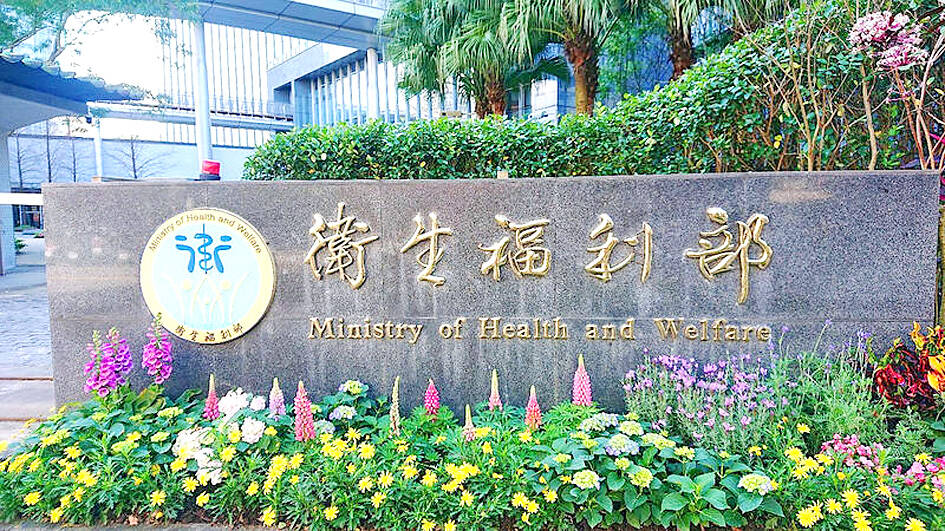The Ministry of Health and Welfare yesterday announced three new policies taking effect this month: expanding National Health Insurance (NHI) medication coverage, increasing free vaccinations and adjusting hospital bed policies during flu season.
Starting this month, the NHI is expanding its drug coverage to include empagliflozin and dapagliflozin for people with chronic kidney disease and congestive heart failure, the Centers for Disease Control (CDC) said.
People with chronic kidney disease receiving these drugs are required to enroll in either the Early-Stage Chronic Kidney Disease Integrated Care Program or the NHI Pre-End-Stage Renal Disease Patient Care and Education Program, it said.

Photo: CNA
The new policy is estimated to benefit close to 170,000 people and cover about NT$1.6 billion (US$48.75 million) in medication fees, it added.
Starting on March 10, publicly funded pneumococcal vaccinations would be expanded to people aged 19 to 64 at high risk of invasive pneumococcal disease, the CDC said.
High-risk groups include “those with splenic dysfunction, immunodeficiency, cochlear implants or cerebrospinal fluid leakage, as well as people with malignant tumors or organ transplants recipients who have received immunosuppressive agents or radiation therapy within the past year,” it said.
Although the flu epidemic has improved over the past two weeks, it is still flu season and the number of people reporting flu-like symptoms remains high, it said.
To provide more space in hospitals for patients, the NHI Administration would allow medical institutions to use special hospital beds as general beds, it said.
This policy would ensure that medical resources are allocated more efficiently, it said.
Meanwhile, amid rising complaints about overcrowding at emergency rooms across the nation since the Lunar New Year holiday, Minister of Health and Welfare Chiu Tai-yuan (邱泰源) on Monday proposed five measures to address the problem, including instructing medical centers to improve inpatient bed allocation and strengthening coordination among regional hospitals.
At a news conference on Thursday after the weekly Cabinet meeting, Cabinet spokesperson Michelle Lee (李慧芝) relayed that Premier Cho Jung-tai (卓榮泰) had instructed the ministry to strictly implement the improvement measures.
Cho expressed hope that hospitals that have already implemented the improvement would continue to do so and that the measures would be expanded to other hospitals to enhance patient triage systems, Lee said.
Additional reporting by CNA

The inspection equipment and data transmission system for new robotic dogs that Taipei is planning to use for sidewalk patrols were developed by a Taiwanese company, the city’s New Construction Office said today, dismissing concerns that the China-made robots could pose a security risk. The city is bringing in smart robotic dogs to help with sidewalk inspections, Taipei Deputy Mayor Lee Ssu-chuan (李四川) said on Facebook. Equipped with a panoramic surveillance system, the robots would be able to automatically flag problems and easily navigate narrow sidewalks, making inspections faster and more accurate, Lee said. By collecting more accurate data, they would help Taipei

STATS: Taiwan’s average life expectancy of 80.77 years was lower than that of Japan, Singapore and South Korea, but higher than in China, Malaysia and Indonesia Taiwan’s average life expectancy last year increased to 80.77 years, but was still not back to its pre-COVID-19 pandemic peak of 81.32 years in 2020, the Ministry of the Interior said yesterday. The average life expectancy last year increased the 0.54 years from 2023, the ministry said in a statement. For men and women, the average life expectancy last year was 77.42 years and 84.30 years respectively, up 0.48 years and 0.56 years from the previous year. Taiwan’s average life expectancy peaked at 81.32 years in 2020, as the nation was relatively unaffected by the pandemic that year. The metric

TAKING STOCK: The USMC is rebuilding a once-abandoned airfield in Palau to support large-scale ground operations as China’s missile range grows, Naval News reported The US Marine Corps (USMC) is considering new sites for stockpiling equipment in the West Pacific to harden military supply chains and enhance mobility across the Indo-Pacific region, US-based Naval News reported on Saturday. The proposed sites in Palau — one of Taiwan’s diplomatic allies — and Australia would enable a “rapid standup of stored equipment within a year” of the program’s approval, the report said, citing documents published by the USMC last month. In Palau, the service is rebuilding a formerly abandoned World War II-era airfield and establishing ancillary structures to support large-scale ground operations “as China’s missile range and magazine

A 72-year-old man in Kaohsiung was sentenced to 40 days in jail after he was found having sex with a 67-year-old woman under a slide in a public park on Sunday afternoon. At 3pm on Sunday, a mother surnamed Liang (梁) was with her child at a neighborhood park when they found the man, surnamed Tsai (蔡), and woman, surnamed Huang (黃), underneath the slide. Liang took her child away from the scene, took photographs of the two and called the police, who arrived and arrested the couple. During questioning, Tsai told police that he had met Huang that day and offered to